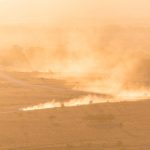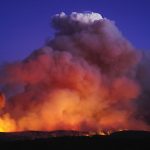 April 28, 2020 3:06 pm
Published by Climate Extremes
April 28, 2020 3:06 pm
Published by Climate Extremes
New study finds ocean heat asymmetry between hemispheres can be explained by natural variability in the climate system superimposed on long-term ocean warming.
 April 15, 2020 11:21 am
Published by Climate Extremes
April 15, 2020 11:21 am
Published by Climate Extremes
Models used to project future climate change, and impacts of climate change on plants and ecosystems, currently assume that mature forests will continue to absorb carbon over and above their current levels, acting as carbon sinks. The findings from this research suggest that those sinks may in actual fact be weaker or absent for forests on low-nutrient soils.
 March 11, 2020 10:47 am
Published by Climate Extremes
March 11, 2020 10:47 am
Published by Climate Extremes
This report responds to a request by the National Climate Science Advisory Committee (NCSAC) for input to its strategic discussions in the area of climate processes research. Specifically, it summarises the current state of climate processes research in Australia, identifies gaps, and provides options for moving the area forward into the next decade.
 March 10, 2020 3:00 am
Published by Climate Extremes
March 10, 2020 3:00 am
Published by Climate Extremes
New international research has found a worrying change in the Indian Ocean’s surface temperatures that puts southeast Australia on course for increasingly hot and dry conditions.
 March 5, 2020 9:52 am
Published by Climate Extremes
March 5, 2020 9:52 am
Published by Climate Extremes
In recognition of International Women’s Day, the chief investigators at the ARC Centre of Excellence for Climate Extremes (CLEX) have signed up to the Male Champions of Change Panel Pledge. This commits the chief investigators to bring gender balance to every forum
 February 27, 2020 3:49 pm
Published by Climate Extremes
February 27, 2020 3:49 pm
Published by Climate Extremes
Kim Reid had a very fruitful conference at AMOS 2020, but she also had two panic attacks. Here she talks about living with these attacks and how someone in a similar situation can navigate and still get plenty of benefits from crowded conferences.
 February 25, 2020 7:34 am
Published by Climate Extremes
February 25, 2020 7:34 am
Published by Climate Extremes
In this study of drought and rainfall over the Murray Darling Basin, CLEX authors find that the length of time between La Niñas and negative-IODs is an important indicator of the likelihood of drought for this region.
 December 7, 2019 11:00 am
Published by Climate Extremes
December 7, 2019 11:00 am
Published by Climate Extremes
This year’s annual workshop, held in Hobart, brought together complex science, explainers, breakout meetings and poster sessions in a way that was perhaps the most accessible yet. It's set a very high bar for next year's annual workshop.
 December 6, 2019 1:28 pm
Published by Climate Extremes
December 6, 2019 1:28 pm
Published by Climate Extremes
The Montreal Protocol, an international agreement signed in 1987 to stop chlorofluorocarbons (CFCs) destroying the ozone layer, now appears to be the first international treaty to successfully slow the rate of global warming.
 November 26, 2019 1:50 pm
Published by Climate Extremes
November 26, 2019 1:50 pm
Published by Climate Extremes
Catastrophic wildfires like the Black Saturday wildfires in 2009 and Canberra Wildfires of 2003, which were so large and dangerous that they generated their own weather systems – including the world’s first filmed fire tornado – are likely to be more frequent in the future as a result of climate change across southeast Australia










